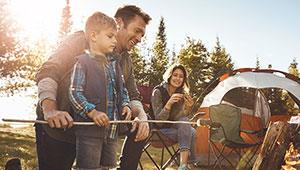Keeping Clean Without a Shower
You'll need: Microfiber towel, all-natural soap, unscented wipes and dry shampooSometimes showering–whether public or portable–just isn't an option. In these cases, you can clean your body with a wet microfiber towel and a few drops of all-natural soap. As an alternative, use baby wipes or Biowipes and dry shampoo. Keep in mind that wipes and dry shampoo should be unscented to avoid attracting bears and other critters.
Of course, taking a dip in a lake or stream is another pretty effective way to get clean, but make sure the soap you use is biodegradable. Having a designated set of clothes to hike (and sweat) in and another set to wear at camp and for sleeping will also help you feel cleaner, longer.
Washing Dishes
You'll need: All-natural soap, a collapsible bowl and a spongeNobody loves cleaning up after a meal, especially while camping, but the process can be made easier. First, fill a collapsible bowl with water and add a drop or two of all-natural soap in the water. Use your sponge to clean the dishes, rinse with clean water and dispose of your dirty water at least 200 feet from any fresh water source. Make sure any bits of leftover food are dispersed throughout the area–not just dumped in a pile–and if you're in bear country, make sure to wash your dishes far away from your tent.
Storing Dirty Clothes
You'll need: A small laundry bag and zipper bagsWhen camping clothes get dirty, store them in a small, durable laundry bag to keep them separated from your clean clothes. Look for bags that are solid, rather than mesh, and in a pinch a plastic trash bag will work just fine. For especially soiled clothes, seal clothes in a zipper bag before loading into the laundry bag.
Frequently Forgotten Items
It's easy to remember the big items, such as your tent and cooler, when packing for a camping trip, but forgetting smaller items is common and can result in annoying workarounds. When you're preparing for your next camping trip, make sure you remember to pack these frequently forgotten items:
• Utensils
• Toilet paper
• Toothbrushes and Toothpaste
• All-natural soap
• Propane for the Stove
• Lighter or Matches
• Flashlights or Headlamps
• Rain Gear
Unpredictable Weather
No matter how much you keep an eye on the forecast, weather can change in an instant–especially when it comes to thunderstorms. If you find yourself caught in an unexpected downpour without access to shelter or your car, here are some tips to avoid lightning strikes:
• First, avoid open fields and exposed peaks, and stay away from tall trees standing alone.
• Tents provide no protection from lightning strikes, but setting up camp in lower areas (such as ravines) may help.
• Also note that flash floods are a problem in the outdoors. During heavy rains, a small creek can turn into a raging river in a matter of seconds. If there's any concern of flash flooding, move to higher ground immediately.
• For a full list of recommendations, visit the National Weather Service website.
In Case of Serious Injury
It's crucial to have a plan in the event a serious injury occurs on a family camping trip. You may not have cell service at your campsite, but even if you do, are you confident you can describe your location with enough accuracy to lead a first responder to you? We don't always communicate in times of crisis, and that's why it's important to have a plan in case something goes seriously wrong.
Make sure to note where the closest hospital or ranger station is to your campsite, and you may want to carry a satellite phone or an emergency communication device (like a Spot or Garmin InReach). Consider taking a Wilderness First Aid course to give you the skills and confidence to think with a level head should anything happen. You'll be able to enjoy your camping trip that much more when you know you're prepared.
- 2
- of
- 2








Discuss This Article